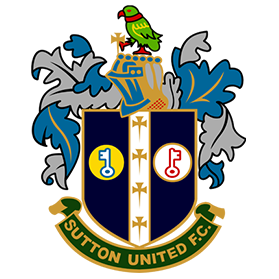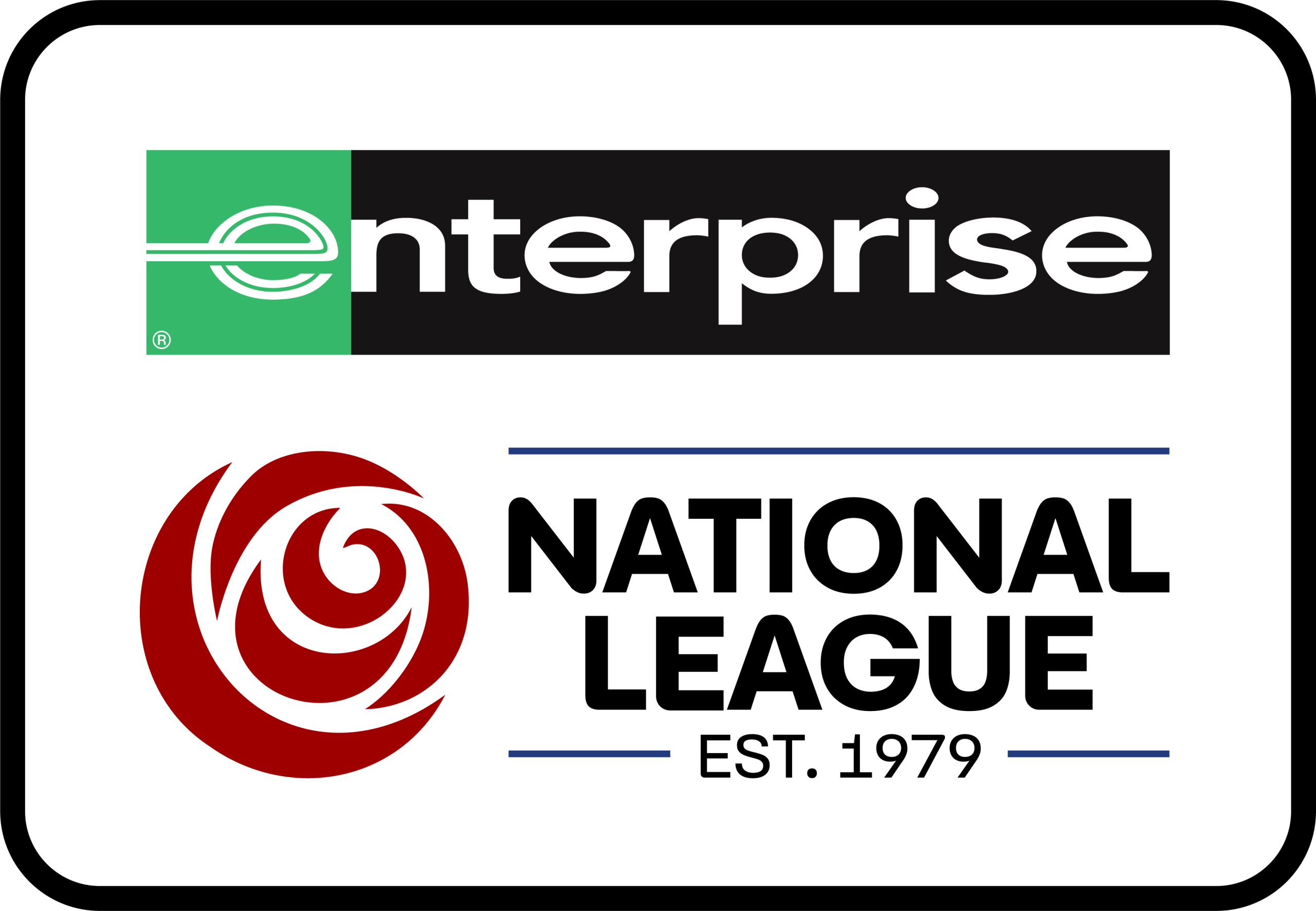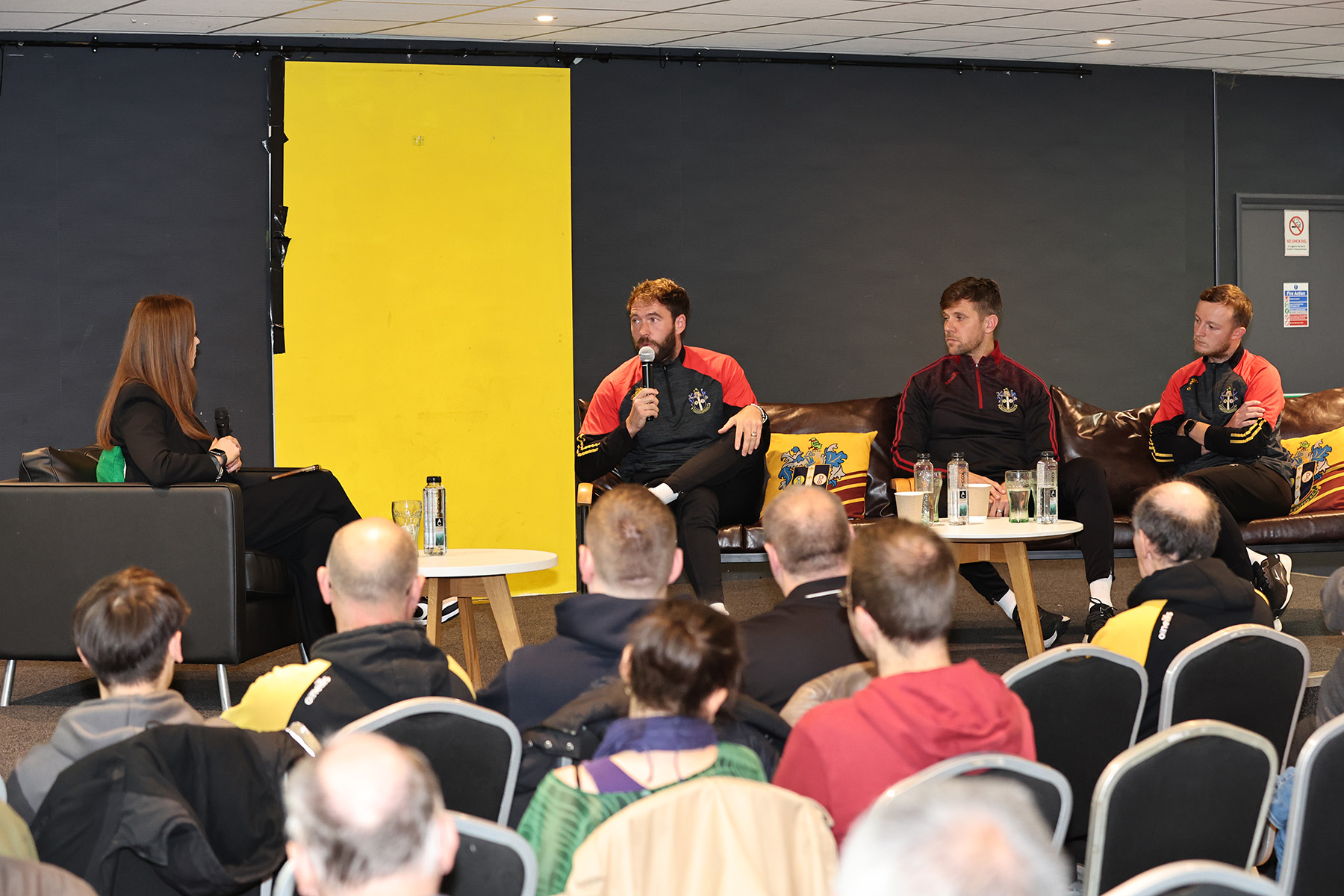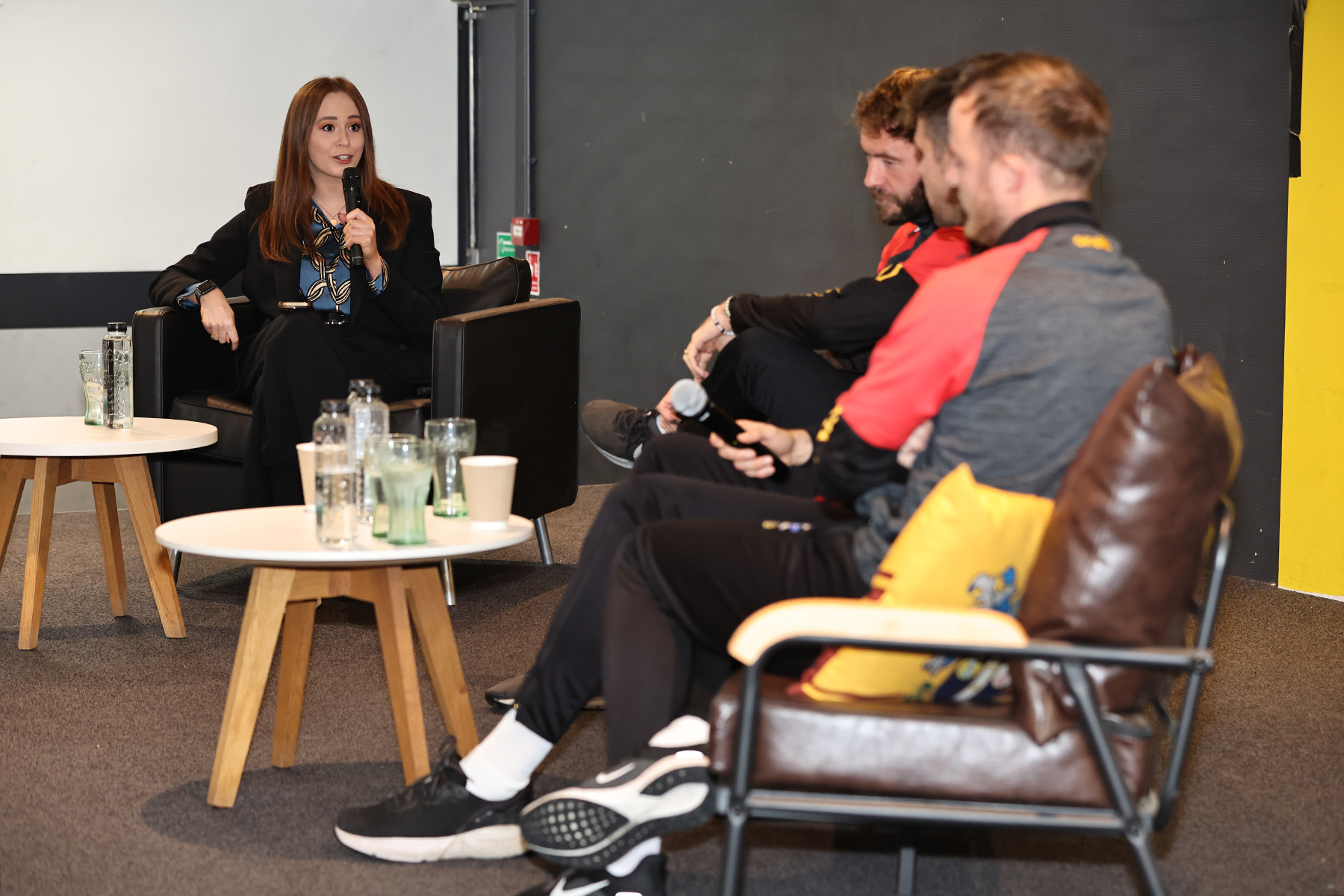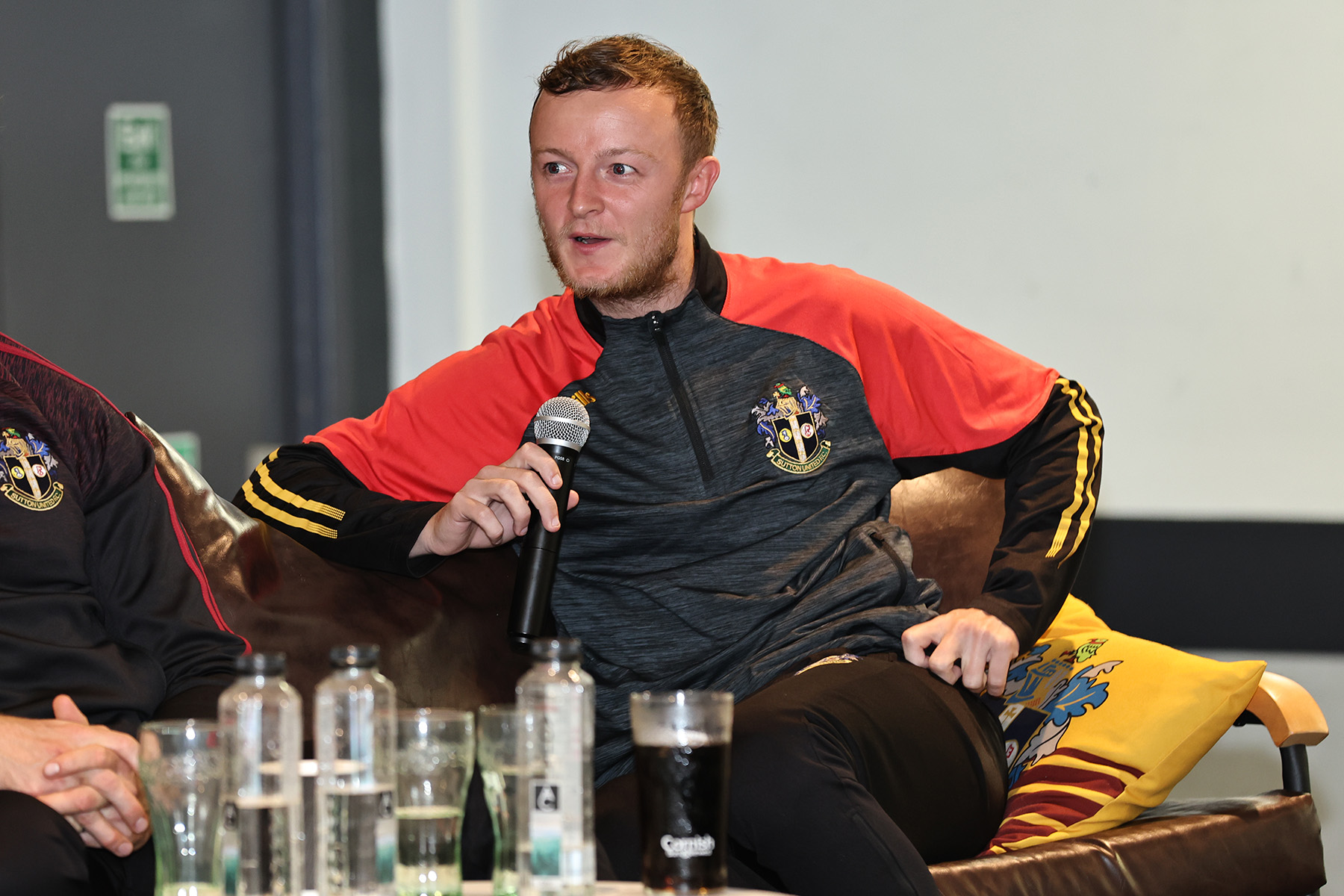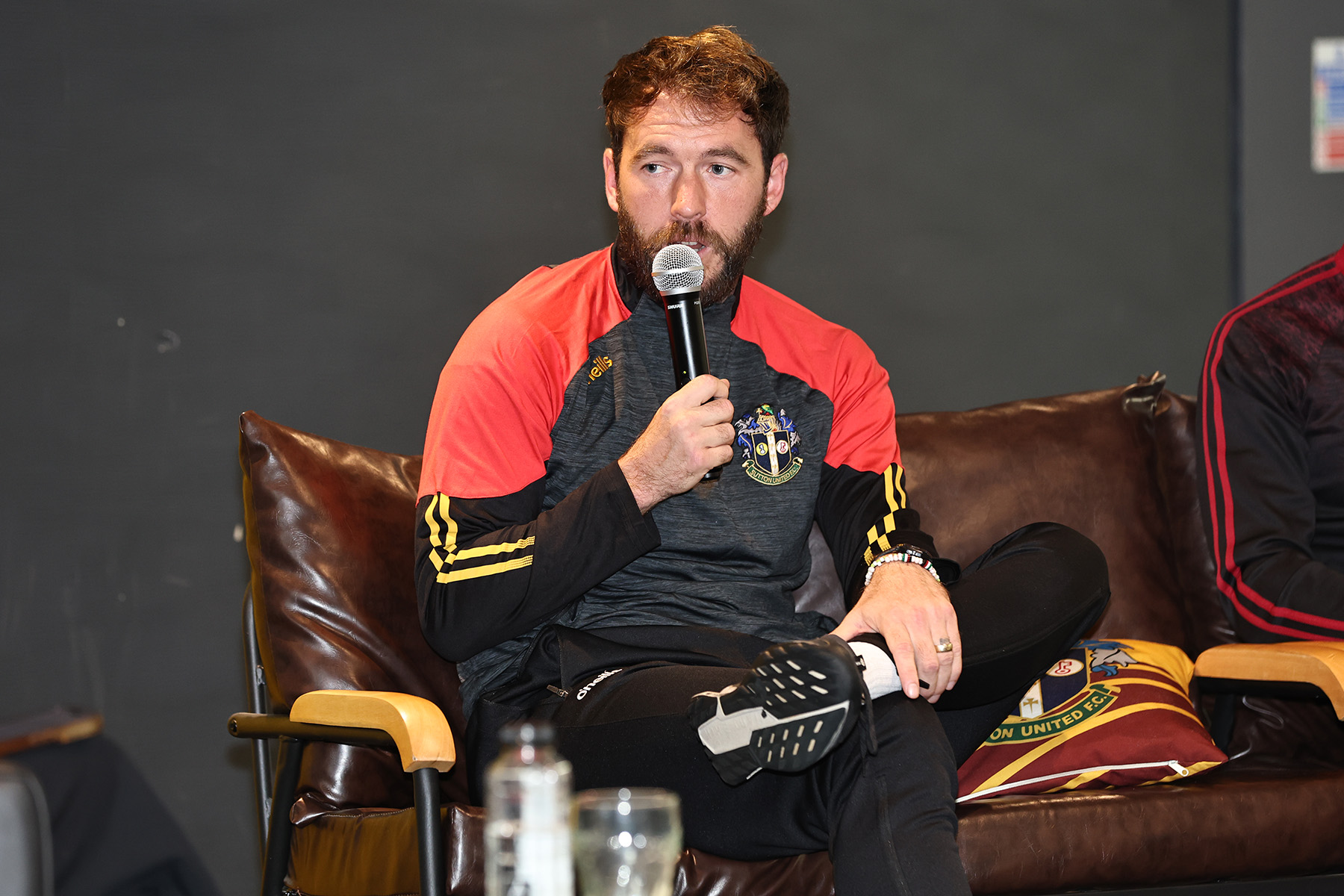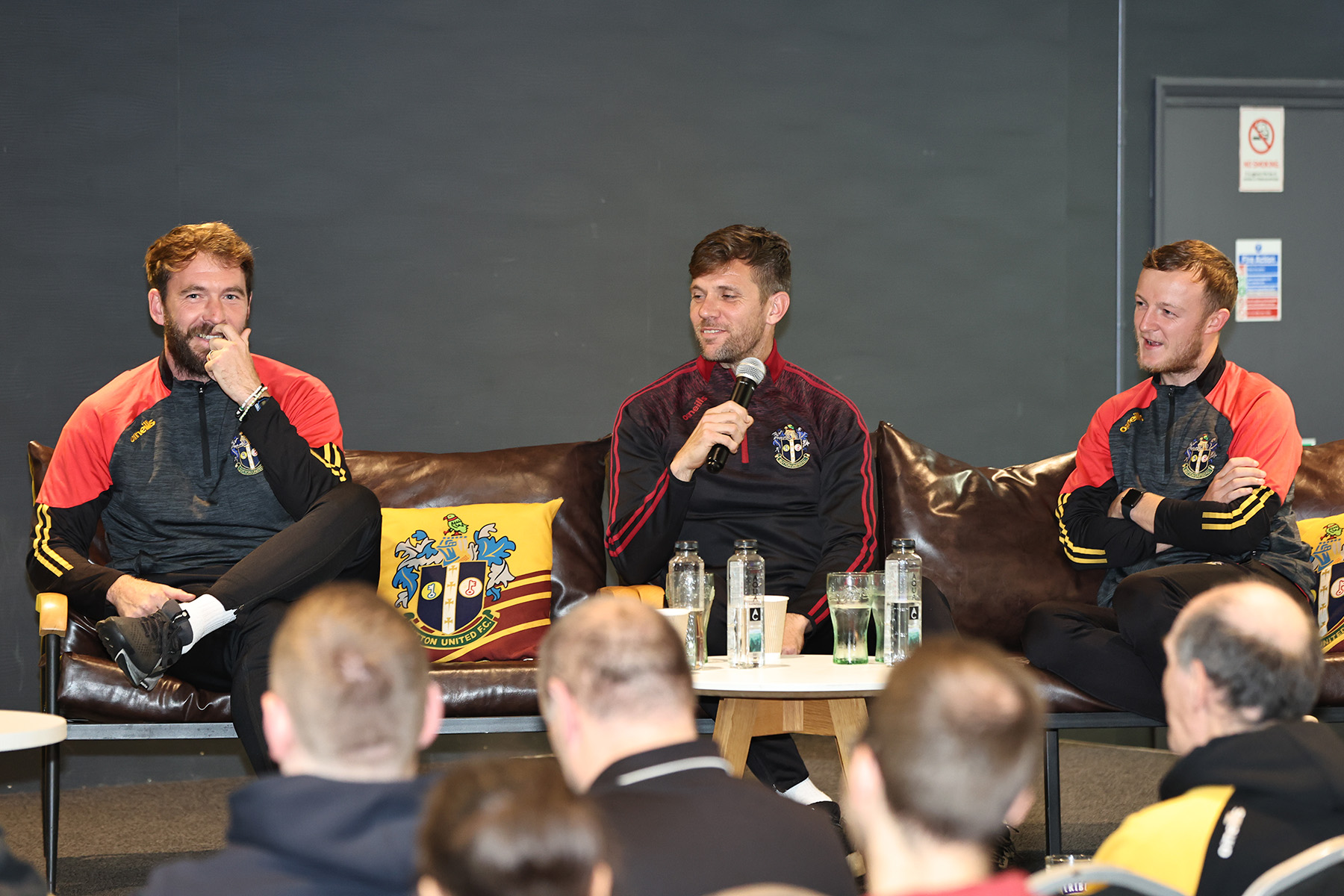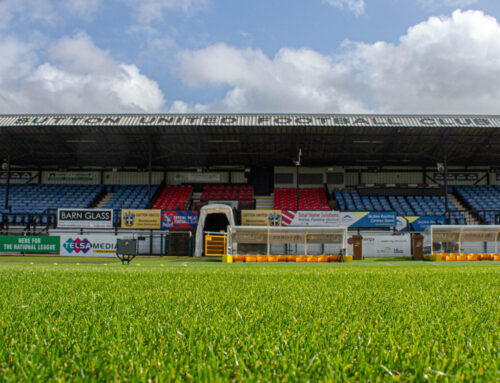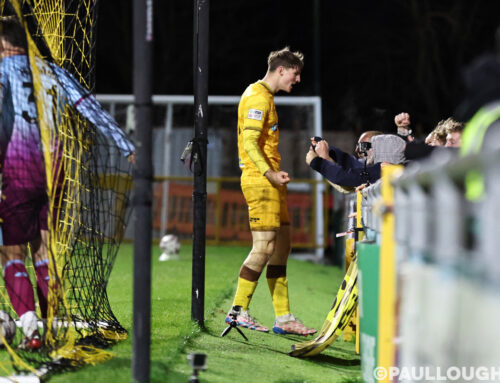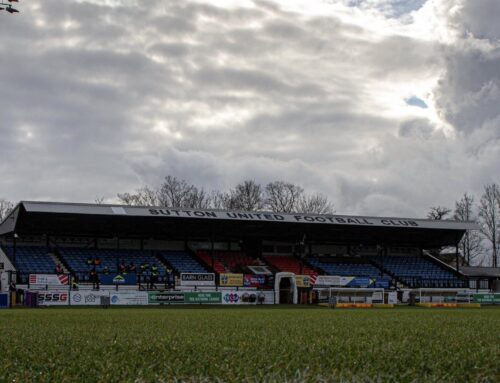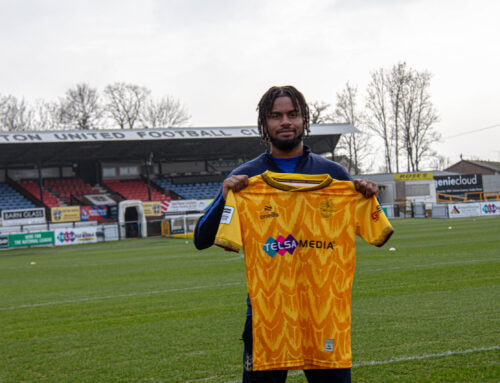More than two hours of hugely informative discussion took place at the Sutton United ‘Meet the Manager’ event on Monday night.
Around 85 fans packed into The MBA Lounge at the VBS Community Stadium for the opportunity to hear from Head Coach Chris Agutter, along two thirds of his backroom team, being joined by Assistant Dean Hammond and First Team Coach/Analyst Ben Cornelius.
Hosting the event was former Sky Sports Assistant Producer and freelance reporter, Sophie Evans, who covered a number of topics on the night with the newly appointed management staff, including their coaching journeys so far and the recruitment process that brought them to Sutton, along with tactics, motivation, achievements and their aims and ambitions for remainder of the campaign.
The final segment of the evening then allowed the fans themselves to get involved, opening up to questions from the audience as a selection of supporters got the chance to grill the panel.
Read on for a taste of some of the questions asked on the night…
Q: Your coaching career includes clubs such as Hastings, Worthing and Brighton, just to name a few. What’s the biggest thing that you’ve learned in that time, and how ultimately has it got you to here?
CA: The biggest thing is, ultimately, you’re dealing with human beings, people, irrelevant of whether they’re playing at Brighton, limited by the Hastings. Obviously, we’ve worked in the men’s side, the boy’s side of the game, so I think it’s about understanding the reality that they’re just people with the same emotions.
Some go on to be worth £100 million, some £50, but ultimately, it’s about understanding people and building relationships and rapport.
Q: With your side being really young, and a lot of your career has been working in academy structures. So how much will that experience help you when dealing with such a youthful side like this one?
CA: I think this younger generation is definitely different to previous, if I’m being honest. And I’ve been fortunate enough – I started managing when I was 27 or 28, so quite young, and I’ve coached for a long time. I think it’s over 20 years now. And during that time, we’ve obviously seen a massive shift in the types of people that are playing football.
This younger generation is probably a lot more delicate than previous. Obviously, society has changed and it promotes different behaviours and personality types in this modern era. So, I think again it goes back to understanding people and understanding that this generation is slightly different. They receive feedback in a different way – more through technology as opposed to direct, face-to-face feedback.
You potentially get less interaction; rather than speaking to someone directly, you might send them a WhatsApp message. They’re probably more comfortable having a conversation that isn’t face to face, exchanging messages or through video clips and remote contact.
So I think with this younger group, you have to be more flexible and take advantage of different coaching aids, technology, and other tools just to try and help them on their way.
Q: Dean, you had a fantastic playing career yourself, playing for clubs like Brighton, Southampton, and Leicester, where you lifted the Championship trophy in 2014, ultimately becoming a Premier League player. How did you make that transition from being a player to a coach?
DH: It’s a great question. Well, I’m early in my journey in terms of my coaching. I really enjoy it – I was very fortunate in my playing career, but I always knew I wanted to go into coaching, even if I didn’t do it immediately after playing. I took some time out of the game for different reasons, but I tried to stay within football – watched lots of games, did media work for Southampton, and stayed as current as I could.
I learned a lot from people who’ve been in the game a long time, like the gaffer here. It’s been brilliant working with him — the lessons I’ve learned have been fantastic. I also try to lean on things I experienced as a player – from the best players, managers, and coaches I worked with – while developing my own ideas and way of thinking about the game.
The key is trying to translate those ideas from your head into something players understand. The way they see the game might be very different to how I see it. That’s been the biggest challenge, but when you get it right, it’s really rewarding.
Q: You mentioned playing alongside some incredible players – Jamie Vardy, Kasper Schmeichel, Riyad Mahrez — amazing names. Looking back, how much pride do you take in having played with people at that level?
DH: Well, not every day in training — they made me look stupid sometimes! But I was very fortunate. It was a pleasure to play with those players. Not only were they great players, but they were also great people. I think that’s why we were successful — they worked hard, loved the game, and always wanted to improve.
When I first went to those clubs, they weren’t the finished article that they later became. They were still early in their careers. For me, it was easy — just get the ball back and give it to the good players. They made me look good!
Q: You said that about being part of a side that wasn’t the finished article but became Premier League winning standard. Do you see an element of that in this team, here in the National League?
DH: Of course. We’ve been pleasantly surprised since we came in — the players have worked really hard, understood what we’re trying to do, and really bought into it. What we’re trying to implement is slightly different to others, but we believe in it and the players have too.
They’ve worked incredibly hard in training – physically, mentally, and tactically. We push them on all fronts — on the training ground, in meetings, in private conversations, trying to build relationships. I’ve always believed that in football, anything is possible. I’ve seen it many times in my career. If you believe in something together and are willing to sacrifice and work hard, anything can happen. There will be bumps in the road, ups and downs, moments of doubt — but it’s how you respond as a group that matters.
And I like to believe that’s the way we live and work – trying to bring that belief into Sutton. 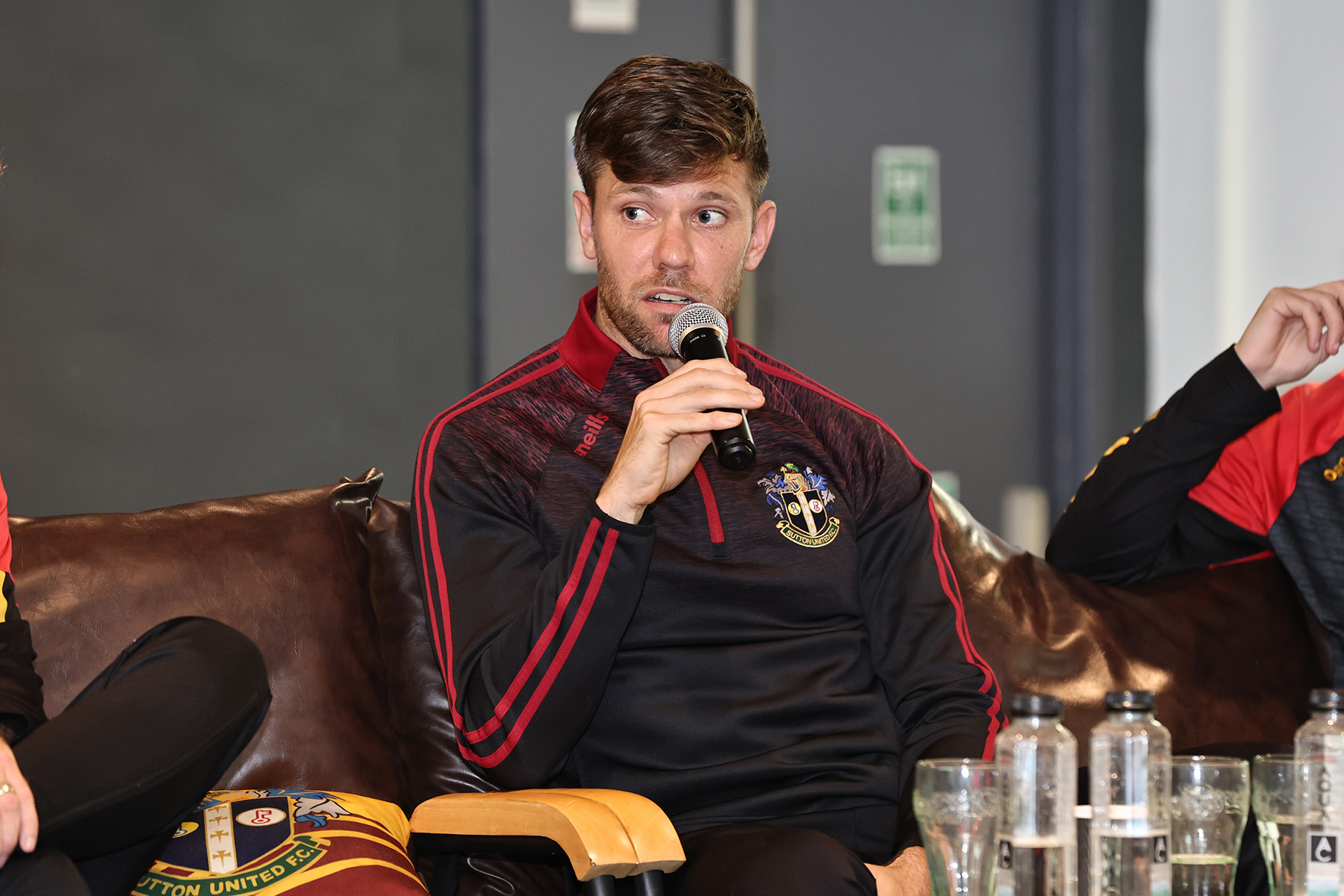
Q: And last but not least, Ben – how about you; Your coaching career so far has taken you from Hastings to Worthing. What made you decide to go into coaching? When was that real “pin drop” moment for you?
BC: When I realised I wasn’t going to make it as a player! I was probably 17 or 18 when I realized I wasn’t going to be good enough to do what I wanted to do in football. Chris [Agutter] had just come into Hastings and was made manager. It was his first job, so he didn’t have a big staff around him. I was transitioning from player to coach, hanging around after sessions, watching training, picking up cones and bibs — just trying to learn.
Eventually, I got a role doing opposition scouting, and things moved on from there. I’ve learned so much from him since – I say “unfortunately” because we’ve spent a lot of time together!
Q: From what we can tell, you’ve known each other since the infancy of your coaching career. If you could narrow it down, what’s the best piece of advice or skill you’ve learned from Chris?
BC: Honestly, just to be yourself. I like to think I’m pretty honest — sometimes brutally so — but I’m genuine. Like we said before, they’re all human beings. I try not to see them as just names or players, but as people.
I try to bring positivity to the group. Whether it’s through advice or energy, that’s the best way to help them.
Q: Do you think that’s already helped you settle in here at Sutton?
BC: Yeah, definitely. I think when people talk about honesty, they sometimes mistake it for being harsh, but really, it’s just about humility. I’ve known a few of the players from before, and that existing rapport helps. It makes integrating into the group a lot easier. That’s probably the best advice I’ve ever had.
Q: And back to you, Chris – just going back a few weeks to your journey here to Sutton, can you enlighten us on what that process was like? From the initial discussions and first phone call to finally putting pen to paper?
CA: Yeah, it was a mad couple of weeks, to be fair. I got contacted via LinkedIn, actually. They basically asked whether or not the position would be of interest.
We’ve got our own WhatsApp group, and I’d be lying if I said that as soon as I saw the announcement that Steve [Morison] had left the club, I didn’t post the link in there saying, “Hang on a minute…”
And so obviously when we got contact from the football club, they were very thorough in the due process — about six Zoom calls. To be fair, the club knew more about our work than I knew about theirs, particularly in terms of the way that we played, which was really positive because it showed they had done their due diligence. They clearly knew what they were potentially signing up for in terms of ourselves as a management team, and that gave me real confidence in the direction the club wanted to go in. There was an alignment in our beliefs, and after many phone calls, there was never really a backward step from our side of things.
Q: If you can divulge, what was the toughest question you were asked in the interview process?
CA: There were a lot, to be fair. The most challenging question was, “What happens if it doesn’t work?” My answer was, “It will work.” That was it. I always think in those processes you’ve just got to be yourself. What I wouldn’t want to do is try to portray an image of someone that wasn’t me. They might think I’m the right person for the job, but the reality is I’m not that person. So we were very straight in terms of: this is what we do, this is how we play, these are our expectations, this is how we manage.
The club had already done a lot of due diligence, so I knew what I was signing up for. It was a real data-driven approach in terms of the direction the club wants to go, the metrics, and the type of football they want to play. We scored incredibly high in that process. We were just being ourselves. That was the most challenging question — what happens if it doesn’t work? But touch wood, it always has. We’ve got real belief in what we do, and we back ourselves.
When asked why Sutton, and why we all showed interest, the answer’s simple. We decided to go on a journey. I came out of academy football – a comfortable role at Brighton, with a clear pathway there – but for me, it wasn’t enough. It wasn’t ticking the right boxes or fulfilling me. I’d had time at Stevenage with the first team in League Two and thought, “I could do this.” You get imposter syndrome at first, but once you’re there, you realise you can do it.
After Stevenage, I went back to Brighton, but there was always that itch to scratch. I ended up going back to my old club Hastings, who were in the relegation zone. Everyone thought I was mad — leaving a Premier League club for a struggling non-league team — but we made that decision together to go on a journey and see how far we could go. We did well at Hastings, took them from fighting relegation to their highest ever league position, and that got us noticed.
At Worthing, two of the best things were getting to work with Deano and having the opportunity to progress together. I’d tried to sign him as a player years before, but he refused! Getting to work with him and drag him on this journey with us has been brilliant. We’ve always said, let’s see how far we can go. We want to reach the Football League, and Sutton United being there is exactly where we want to be.
When we look at the support around the club — the owners, the fanbase – we think, why not? If you back yourself, anything’s possible. That’s what prompted me to put the job link in the WhatsApp group.
BC: For me, there’s a huge trust in the manager – his decision-making, the way he leads, his ideas. I really believe in that and trust in that. There was no question in my mind that I’d follow him here.
I’m 27, part of a young, ambitious management team. We’re all really driven, and Sutton is a great fit for that. It’s a club that should be nowhere near where it currently is, and we’re determined to help take it forward.
CA: Those first few days at the club were mental. I remember planning training ten minutes before it was due to start while being asked if I needed a kettle for the office. Meeting so many new faces was overwhelming, but everyone made us feel incredibly welcome. It reminded me of my first club, Hastings — that same community and family feel, just on a bigger scale. Everyone wants you to succeed and is eager to help.
Terry [Bullivant] and the staff were amazing in those first few days. We were in work until 11pm at Worthing on Thursday, then at Sutton at 7am on Friday with a completely new group of players, preparing for Braintree. It was a whirlwind, but the warmth and support from everyone gave us a great platform to start from.
That community feeling is undeniable. I’m a “what you see is what you get” person. Any engagement you’ve seen with fans isn’t political — it’s genuine. The warmth and connection from the supporters have been immediate, and we just try to mirror that back. You’d never see me in a pink hat anywhere else, but it shows the connection we already feel.
We’ve had a good start, touch wood, and that’s down to that shared connection and support.
Q: What does a day-to-day week in the life of Chris Agutter look like?
CA: It’s quite structured but flexible. Monday is a post-match meeting – team reviews, unit meetings, individual discussions. We go over the previous game and start looking at the next opposition. Tuesday and Thursday are training days with a mix of team and individual sessions. We use a leadership group to give players ownership and responsibility, including deciding when they want the team selection announced.
We’re open with players about what went well and what didn’t. For example, against Hartlepool, we were too slow to react to their tactical change, and I told the players that. If we want them to take responsibility, we’ve got to model that ourselves.
We don’t pretend to know everything. We’ve got experience in the squad, so we lean on it. If we can role-model honesty and accountability, it builds trust. That’s the culture we want to create here — open, hardworking, and together.
DH: Some days we might be doing a lot, but other times, the gaffer might just go, “Well actually, I need to be with the players today. I need to coach this.” It’s really important that he feels the players need that from him – they need to hear his voice that day.
There might be other times where the gaffer wants to sit back and look at things, and actually goes, “Well, can you drive it today?” I think that’s where we’ve potentially worked well together.
Q: When you just mentioned speaking to players more and more, not just seeing them as a full collective — without naming a name — is there a particular conversation you’ve had where you think, “This has really changed the way this player is feeling and how they’ve been performing”?
DH: It’s more individual things. I would never try to tell a player what to do. I’d try to understand what he sees in that moment, what he’s feeling, or maybe just give him some reflection of what I felt in my career in those moments and share experiences. I want to understand what they’re seeing, because as we’ve said before, we don’t know everything — but there is stuff that we do know as well.
I want to know what they’re seeing in that moment, because it might be different to how I see it. Then you can share, discuss, and talk about it. They’re not long conversations — they’re moments where you might see something in training, praise someone for something they’ve done, and maybe question something else to learn a bit more. Maybe they’ll say, “I saw this and that’s why I did it,” and then you’re learning yourself.
I think it’s really important that it’s not structured. It’s not like school where you bring someone into the office and sit them down. It’s more when you’re walking in from the training ground or into another part of the session, just having that fifteen, twenty, thirty seconds with a player — it’s so valuable. If players can be seen and heard, you’ll get real buy-in from them. It’s not about intimidating people or making them feel pressured; it’s about helping them express themselves as who they are.
CA: Deano’s being really humble there! When Brandon [Njoku] came across the defender for the second goal on Saturday, Deano was talking to Brandon about that, working with him at the back end of last week. That was an individual conversation, and that’s the kind of detail that goes on behind the scenes.
What’s been missed there is how much reviewing we do. It’s not just when we’re in the building, when we’re working. I know for a fact, when we’ve been here since seven this morning, we probably won’t get in until late tonight. And I know for a fact there’ll be a message in our WhatsApp group at one in the morning asking how training was today.
There’s so much that goes on when we’re not in the building — reviewing, planning, looking ahead to the next opposition. It’s not just the hours in the facility; there’s so much more to it when we’re away as well. And yes, we do occasionally fit in some golf on a Wednesday – I think that was missed from the schedule! But yeah, there’s just so much more to it than when we’re in the building, because we’re so keen to get every detail right.
We’ll miss bits, of course, but there’s a lot that happens behind the scenes.
Q: And how quickly do you feel like the team has adapted to that new work?
CA: The challenging one that you’re putting in, but ultimately the one that is needed. What I’ve put into it, they’re doing it. Now we’re going to ask even more of them, and we’re going to demand even more of them – and we always will. It will never be enough. I think that’s the biggest thing for us. It will never be enough. But they try, and the intention is there.
It’s not always going to be right. There are going to be moments where we’re going to question things, and there are going to be moments where they probably question us as well. I think that’s important. But we’ve seen it and we’ve achieved that at other clubs, so we know it works. That’s really, really important as well. If we really believe in something, we have to believe in it. When we do believe in it as much as we do, I think the players start to believe in it as well. They’ve bought into it. We’ve seen glimpses, but we’re going to want even more – and even more. When we’re winning games, we’re going to want even more. I think that’s why we’ll be successful.
So in terms of getting the players to buy in, that’s unbelievable. We want something to be successful, but there are also individual players who want to climb up, to play at as high a level as possible – as we all do. From an individual perspective, we’ve told Simps [Lewis Simper – as well as the rest of the group: you run, and you run hard. You’ll get more goals, more assists, you’ll turn the ball over higher up the pitch.
These are the ideas in possession: if you don’t run all over the place all the time and actually just stand still sometimes, we’ll get the ball to you closer to goal, in a better position. Sometimes less is more from you. Trust your teammates to get you the ball. Within two weeks of working together, he’s [Simper] now seeing the benefit of that – running more, running hard for his teammates, being more disciplined position-wise. His goal contributions are rising, and if he keeps that up, it’s going to help the team succeed. Individually, he’s going to potentially climb even higher, faster, which is what you want from any ambitious player.
Q: Lewis is a player with EFL experience, having played at Cambridge United. Do you think that gives him confidence, and also gives the rest of the dressing room confidence to say, “Oh, actually, that improvement has really made a difference in a short space of time?
CA: He’s one of the best parts of the football club for me. We’ve been quite clear about that. We’ve told the lads: get the ball to him. Let’s get him the ball where he can be most effective.
If I’m a teammate and I see the best player in the football club running hard, fighting, doing the ugly side of it — you think, “If he’s doing it, I’ve got to do it.” And when you see the benefits of him doing that – for example, Brandon [Njoku]’s goal at the weekend came from Simps pressing someone, rushing someone who didn’t even touch the ball but forced a mistake – you see the impact. Those moments are hugely influential. When your best players do it, it’s easy for the rest to follow.
It’s hard for any man – if they don’t run, the likelihood of them being effective is slimmer. So it’s about making sure they’re in a position, physically and mentally, to do that for 70 to 90 minutes. Getting them up to speed, to an intensity where they can do it for the full 90, even on our worst days when the football isn’t perfect – that’s the biggest impact we’re looking to make.
Q: You’ve touched on the size of the squad — something that ultimately will have to be looked at. But when you take over a team halfway through the season, the narrative is that you’re inheriting a group you didn’t build. Does that make you more motivated to make it work with the players in front of you?
CA: Definitely. We had the option to sit in the stand at Braintree away, in suits, watching the players. But we didn’t want to do that. We saw it as a missed opportunity if we didn’t get straight in with the group.
We view everything as an opportunity — that’s our outlook. We’re very much glass half full. If the club wasn’t in the situation it’s in, we wouldn’t have had the opportunity to come here and make an impact. So we just see it as a chance to make our mark and help the club get back to where it should be.
Q: Can you put any names between the three of you that have really stood out to you, maybe not necessarily in terms of ability, but also that mentality since he joined as well?
CA: I got a message from Hayden [Muller] and he said, can I come in and train because Salisbury aren’t training until Thursday? And I said, yeah, no problem. And he did want to come in and was the best player in training. I said, how the hell is he out on the loan? That was a big thing.
We know him from Dundalk where he played in midfield and he was outstanding, so when he came in and trained well, and then off the pitch, we were sitting here having lunch and he was the glue that held the group together. Everyone just gravitated towards him. We had this unbelievable personality and leader despite his young age, and a very capable footballer that wasn’t even in the building. That was a big thing for us – how quickly can we get him back?
DH: I’m probably a little bit biased because I’ve worked before, but I’ve got a lot of respect and time for Jack Wadham. He was brilliant at Worthing, I think he’s got so much ability, lots to work on as well. There’s lots of development in him, I think he can be a real asset for the team, the club. I’m a midfield player, so it’s my job to help him, to support him as well.
A lot of the stuff we go through goes unnoticed. He can do a lot more, we’ve had a lot of conversations about him so far. He sees things, and it’s down to us to bring that confidence in him to back himself, play the passes we know he can play, make the drive and runs through midfield that he can do, and the other bits off the ball. He needs to improve, of course, but he’s still a young man with so much ability. He’s a great lad, quite quiet, but he has moments where he speaks and moments where he demands of others. We need to bring that personality out in him. I’m really looking forward to working with him again.
The best of Jack Wadham is a player who understands the concept of play under pressure; he knows where he is on the pitch, his awareness is really good. He sees a forward pass, we want to see more of it, and we’ll try to play forward first around the corner into the forward players so if you’re a forward player, you want to get the ball to Jack first because he can find you in those areas. He’s got the ability to play those passes; he just needs to do it more. That comes with confidence – he is someone we can lean on because he knows how we want to play. He’s a young man learning.
BC: Probably David Ogbonna for me, similar to what I just said about others—not everyone realises how good he can be. If he comes up against a full back this year as quick as him, I’ll be shocked. He needs to realise how good he can be. We saw that in the first 20 minutes Tuesday; any time he got on the ball, it was one of those moments where you start to see him develop belief. As soon as he starts getting more belief in his thoughts on that full back, even more, and gets inside the box, I think it will lead to more assists in his game. He’s got a real chance to be a big-time player for us this year.
Q: I’m sure I speak for everyone in saying that it’s so exciting to get a last-minute goal, but ultimately to turn those into three points is what matters. You’ve touched on the match fitness – what else are you targeting to make sure you can maximise the games going forward?
CA: We need to be better on the ball as a starting point. We believe the best way to defend is by having the football. It’s really basic – if you’ve got the ball, they can’t score. We want to play in the opposition’s half and keep them under pressure. Sometimes that gets misunderstood because we do have the ball around the 18-yard box at times, and it can be misconstrued that we just love having possession of the football. That’s definitely not the case. We want to attack the opposition’s goal.
What we might need to do with Naders up front, for example, is try and isolate one-v-one situations in big spaces. We’ll play passes from deeper areas to attract pressure and then look to get Naders into those big spaces. We want to get better with the ball, play in the opposition’s half, create more chances, and get more bodies into the box. When I was watching footage in preparation for the job, we didn’t get enough people in the box. It sounds basic, but the more people you have in the box, the more likely you are to score.
We’re big believers in that kind of football, but equally, if you commit that many bodies forward, you’ve got to be ready to stop counterattacks. When possession turns over, we want to stop teams at source and regain the ball on the edge of their box. That’s a big priority for us.
We also need to get the lads running more. It sounds basic, but we’ve been covering around 106km, and we want that up to 118 or 120 – sometimes even 125. The further they can run, the harder they can run, the more effective we’ll be. As basic as it sounds, that’s a real priority.
Fitness is key. It’s difficult at the moment because we went into the last few games physically fatigued. We know we weren’t as fresh as we could be, but if we can put good work into the players now and expose them to the physical stresses needed to play our kind of football, we’ll be in a much better place long-term. The challenge is to keep developing the players and the group while still getting results.
Maybe we haven’t always picked the best team so far, but one thing I do know is we’re physically massive. In the short term, we can be really good in both boxes — that could be the difference between drawing, losing, or winning games. So while our eyes are on the bigger picture, we’re also focused on the short-term points and buy-in from the players.
Q: It’s been fantastic getting more insight into what’s happening on the pitch, but the focus now is looking ahead. You’ve spoken about that community feel — have you had any memorable interactions with fans?
CA: It was after the game on Saturday. I had three selfies with the same person who kept forgetting they’d already taken one. That for me summed it up – the appreciation and excitement were brilliant. My wife and family were also at the game, and even she was really positive about how welcoming everyone was. The club showed them around and made them feel part of it, which meant a lot.
We also went to the Robin Hood pub after the game, which was lively – thankfully we stopped short of karaoke! It was great to connect with supporters, even having proper football conversations late into the night.
It’s so important to have that community connection. You want to understand what the fans want and how they see the club. Those conversations help us feed back to the players, and it works both ways. The staff at the club have also been brilliant, taking time to talk and share stories.
For me personally, a fan made cakes and cookies for the players and staff — it seems small, but it meant a lot. It’s those moments that build togetherness. Players, staff, fans — everyone’s part of the same thing.
Overall, there’s such a positive, family feeling around the place. It reminds me of my hometown club. Even though we’ve only been here just over two weeks, it already feels like home. The warmth and support are incredible.
You can see it in the way the fans push us on. Every time we’ve scored a late equaliser or winner, it’s as much down to them as it is to the players. You can feel the connection building. The fact that we can go to all four sides of the ground, applaud the fans, and know it’ll be reciprocated says everything.
That’s the kind of connection we’re trying to build — that sense of everyone being part of the same effort. The players need to understand their responsibility and who they’re playing for. When the fans see that and the players feel that support, the momentum is unbelievable.
We’re process-driven. We know if we deliver our best version, the results will come. Sometimes you play well and lose, sometimes you play poorly and win — it’s about consistency. We’re not focusing on relegation; we’re looking upwards. Why can’t we be the team that makes a late push for the playoffs?
Photo Credit: Paul Loughlin
